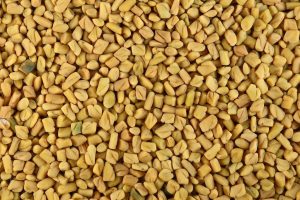Libido booster fenugreek shows promise in elevating growth hormone, but research evidence is limited.

- Stimulating the pituitary gland. Fenugreek may boost the release of GH as well as luteinizing hormone (LH) and follicle-stimulating hormone (FSH) from the pituitary gland.
Overview
Fenugreek, Trigonella foenum-gracum, has a long-standing reputation as a health-promoting plant with presumed origins in the Near East. Its use as a type of nourishment has been reported in ancient Hebrew and Roman texts, and its leaves and seeds have been discovered in sites as old as Tutankhamen’s tomb.
Influenced by its use in traditional Chinese and Ayurvedic medicine, fenugreek is commonly applied to deal with digestive problems, reduce pain, as well as to ameliorate symptoms associated with kidney ailments and diabetes.
Fenugreek’s surge in popularity among male athletes and fitness buffs stems from its persistent reputation as an aphrodisiac and all-around sex-booster. Recent research is beginning to shed more light on its benefits as a supplement, one of which may include elevated growth hormone levels.

How Fenugreek May Help With Growth Hormones
Stimulating the pituitary gland
Fenugreek is particularly abundant in steroidal compounds, such as glycosides and saponins, which may be capable of stimulating the pituitary gland to secret growth hormone alongside other hormones such as luteinizing hormone and follicle-stimulating hormone (FSH). In particular, Diosgenin, a widely present saponin in fenugreek seeds, is a known precursor for the production of several sex hormones and is claimed to improve muscle growth and overall weight.1

Fenugreek Benefits & Uses for Growth Hormones
The primary, scientifically backed health benefit of fenugreek seems to be sugar control, such that it may be used as an adjuvant in diabetes management.2
In certain athletic and fitness circles, fenugreek is prized for its potential to enhance physical strength and endurance while boosting testosterone, although such claims are contested.3 Accordingly, fenugreek is proposed to stimulate fat burning and enhance muscle mass, which may be linked to increases in growth hormone. However, research evidence for this is currently lacking.

Research
Animal Research
Research demonstrates the capacity of fenugreek to increase growth hormone levels in various animals.
Fenugreek (20 mcg/mL) may stimulate growth hormone release from rat pituitary cells
In this investigation, steroidal saponins at various concentrations were given to adult rats. Intake of fenugreek saponin I resulted in a 12.5 fold increase in growth hormone release via stimulation of pituitary cells at a concentration of 20 micrograms per milliliter.
- The study concluded that “steroidal saponins stimulate rat growth-hormone release in rat pituitary cells.”4
Fenugreek seeds (60 g) may increase growth hormone levels in lactating goats
In this controlled investigation, 12 lactating Saudi goats were either fed with 60 grams of fenugreek seed powder or a control every day over the course of a 7-week period. Daily milk yield was found to be significantly higher (1236±38 vs. 1093±43 mL), plasma levels of glucose lower, and mean plasma levels of growth hormone significantly higher (0.27±0.09 vs. 0.21±0.02 ng/mL).
- The study concluded that “fenugreek feeding increased milk production in goats and this effect might be mediated via growth hormone stimulation.”5
Fenugreek methanol extracts (300 mg/kg, 60% saponin) may be a viable growth promoter in Nile tilapia
In this investigation, 15 Nile tilapia were fed either a control, 60% saponin fraction of fenugreek, or 80% saponin fraction of fenugreek at 300 mg per kg of body weight daily for 8 weeks. Fish given the 60% saponin fenugreek extract exhibited the highest expression of growth hormone and insulin-like growth factor-1 along with the best growth and lowest oxygen consumption parameters.
- The study concluded that “a certain potential as growth promoter might be found in the 60% MeOH saponin fraction from Fenugreek or in crude saponin extracts and that the effects of the saponins are likely to be concentration depending.”6
Human Research
There is a current lack of clinical research focusing on the direct relationship between fenugreek and growth hormone in humans.
In this randomized, double-blind, placebo-controlled investigation, 6 healthy males undergoing resistance training were given either a placebo or a capsule containing 300 mg of fenugreek, two times a day for four days a week over an 8-week period. Compared to the placebo, Fenu-FG supplementation showed significant improvements in body fat without a reduction in muscle strength as well as increases in free testosterone. Muscle strength and endurance was also improved in some but not all categories.
- The study concluded that “Fenu-FG supplementation showed promising anabolic and androgenic effects in male subjects during 8 weeks of resistance training program…without serious adverse events.”7
Dosage for Growth Hormone
- Given the scarcity of research, it’s difficult to suggest a fenugreek dosage for GH
- Supplements typically provide 900 – 1500 mg fenugreek seed powder doses
The leaves and seeds of fenugreek can also be pressed into oil or made into flour and then baked as bread.
Supplements in Review Says
- Fenugreek extract, 1000 – 2000 mg daily for growth hormone.
Fenugreek shows promise in promoting growth hormone but is not recommend due to lack of clinical trials. Fenugreek is not the best option when it comes to elevating growth hormone levels. Although it may stimulate GH release in animals, there isn’t enough evidence that it works in humans.
Best way to take fenugreek is as a standardized 1000 – 2000 mg supplement. Until more clinical studies are conducted, we recommend sticking with standardized fenugreek supplements, such as Fenusterols®. For better growth hormone enhancements, check out other supplements like 5-HTP and colostrum.
Leave a Reply